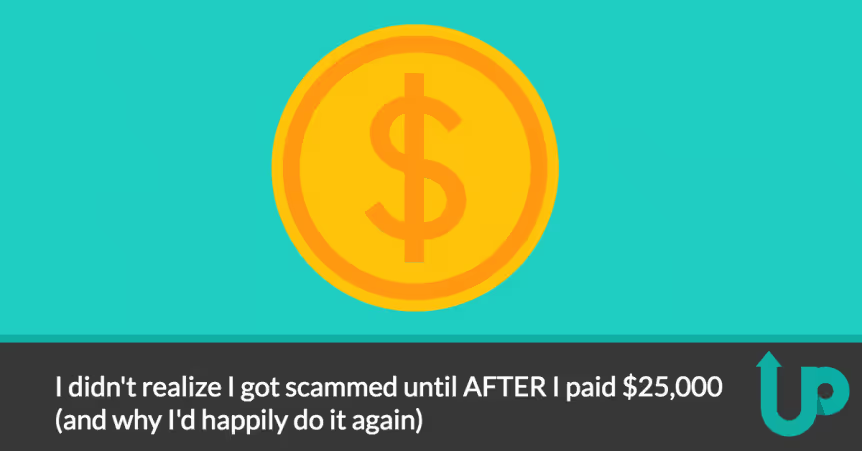In episode #28, Wilco shares about his experience about selling a business.
Links:
Hey, hey, hey, everyone. It's me, Wilco de Kreij here, and I am back for yet another episode. It's been a while sine I recorded the last one, so it's about time that you and I hang out. Today, I wanted to talk about selling your business, and more specifically, about my experience about selling a business because not everything went as smooth as it should have gone. There's quite a few lessons I learnt along the way, and that is what I wanted to talk about today with all of you.
For those who are wondering, no, I did not recently sell my business or anything like that. The last time I sold a business is actually quite a few years ago. I think it was around 2012, so around five years ago already. It's been a long time. Before that time, I sold various smaller projects like when I was still a kid, more than 10 years ago, when I sold smaller sites, I would say. I wouldn't even call it a business, but more like I sold smaller sites for four or five-figure deals. Sometimes, I sold it for 4, 5,000 euros, and sometimes for 11, 12, but that's the ballpark figure. Now, when I sold my business five years ago, it wasn't actually super big as well. It was six figures in euros, but unfortunately, I cannot really disclose the exact amount. It wasn't something super big, but for me at the time, it was obviously super big, right? It was like wow, that amount of money.
I wanted to guide you and let you in on the behind-the-scenes of selling that business because it actually did not go as smooth as I thought it should go. Basically, for those of you who are following me for a while, you may know me from WordPress for Facebook. That was a WordPress plug-in that allowed you to create Facebook welcome pages, basically. That was a thing back in the days. That was a WordPress plug-in that allowed you to do that quite easily. Initially, I launched it. We had a free version. Then, we had a pro version. Then, we had a 2.0 version, but at some point, I wasn't really excited about it anymore, which is like I was doing all. Most of the support, I was doing myself. I wasn't really growing anywhere. We weren't moving forward, and because I was spending so much time on just maintaining it, either the support but also the development side of things because WordPress kept on changing their platform, blah, blah, blah. I just wasn't excited. Then, I felt that it had a lot of potential, so it will be a waste if i would just let it die.
At some point, I decided, "You know what? I'm going to put it on Flippa. For those who don't know, flippa.com, it's like a ... Excuse me. It's like a website where you can list sites for sale. I put it up there, and I tried to ... I was hoping that people would actually go on a bidding war, and they would try to sell it. Unfortunately, that did not work out. I actually realized that. I remember that I actually did this while I was traveling. I was traveling through Australia and Asia at the time for four months period with my then girlfriend, now wife. We were traveling around, and that's actually when I realized I really, really didn't enjoy it anymore because at that time, I got to think about what do you enjoy? Where do you want to go? This was not the business I wanted to be in.
I remember at a coffee shop somewhere in Thailand, I actually put it up online and said, "All right, so we're going to sell it. I'm going to list it on Flippa." We did get quite a few bids in, but I think if I remember it correctly, we did less than a quarter of what it's actually sold for. In other words, the max bid that I got on Flippa, it was not a lot. A quarter of what I eventually would sell it for. Just to be clear, I did not sell it on Flippa. I wasn't happy with the bid. I was like, "For that amount of money, I'll just keep it myself." That's when I got a broker involved. In this case, I went with FE International. If you Google for them, FE International, you'll find them. They have a bid network of people who basically are interested in more higher ticket size or online businesses that are worth more. I think back then, this was average right now. I'm not sure if they would sell for something this small. They're mostly working on even bigger projects, but it's always good to get in touch with them.
I think that was my first lesson learned. Don't try to just ... If you're selling something for a couple thousands or maybe 10,000 or 20,000, then sure, you can just do it by yourself on Flippa. If you're trying to sell something fairly bigger, then, I would highly recommend you to get a broker involved because they just ... It's not just about the legal expertise that they bring in, but also the network they have in place. That's, I think, the biggest value it had for me, because like I said, on Flippa where everyone could see, and I actually did advertise quite a bit on Flippa to make sure people actually saw it. The highest bid we got was like a quarter, 25% compared to the bid we got through FE International. That's my first lesson I learned. It would have saved me quite a few months if I would have done that right away. Anyway, I did not.
Second lesson that I learned is I thought it was worth a lot. I was like, "Ah, but it's going well. We're getting a lot of sales in." The problem was that when we were selling that plug in, we were selling it for a one-time fee. In other words, people would buy it once, and they can keep on using that plug in forever. We'll have to be the ones maintaining it. Because of that, the evaluation, what I thought it would be worth for just what it was actually worth was under ... Let's just say there was a big difference. It was not worth as much as I thought or as I had hoped because we weren't doing anything recurring. In other words, there's no consistency in the business. We were selling relatively consistent, but if for example, traffic source would dry up. You only needed one thing to go wrong, and all the revenue will be gone.
The more risk there is for a potential buyer, then obviously, the lower the evaluation's going to be. If you are ever planning on some kind of an exit or like selling your website or selling your business, it makes a lot of sense to have recurring in your business. It's going to boost your evaluation way, way up.
Another thing I learned is that I was too involved in the business, right? If someone is going to take over, I was thinking like, "Oh, so someone else is going to buy this website, who's going to buy my business, and they're going to do what I do." Well, guess what? People who have money like potential buyers, they don't want to do what you do. They just want to buy and invest, basically. The moment that they're trying to buy something, and if it actually requires work, they're not going to do that themselves. All they think is like, "All right, so all of the work that you as the owner is doing, could we train someone to do that? How much would that person cost?" Also, there's once again, a bit of a risk there because can they actually train someone to take over their work, right? That's going to be the question.
The moment that you already get yourself out of the business, and what I mean is you're not doing any of the active work. You're just working on the business from the sidelines. That's it, but all the ongoing work is being done by a team. Then, once again, it's going to be, first of all, way easier to sell. Secondly also, they're going to be willing to spend more because they don't have to hire. They don't have the risk of like, "Hey, can we actually find someone to do all of these?" You can just say like, "All right. I don't have to put a lot of work in this. I check the stats and that's it. Other than that, the team is taking care of it. The team will be helping you out instead of me," so you will be once again, selling a business. It's not just a site, but you are actually handing over the team. Obviously, you want to get your team involved in that process as well.
Yes, you want to get yourself out of the business. That's definitely another lesson I learned. I should have done that before I went into all of these. That would have helped me a lot. Yes, if you are ever trying to or thinking of selling your business, make sure you are not working in the business by the time that you're going to list it for sale. Also, another thing is that I never really thought about, and that is to have different merchant accounts. Obviously, you're gathering payments, you're collecting payments through some kind of an account, whether that is Stripe or PayPal or ClickBank or whatever it is, it's going to be good to have things divided between multiple accounts. Let's say you have multiple projects or multiple business, and you're thinking that maybe in the future, you're going to sell one of them separately. Then, don't have them all on the same merchant account because if you do, it's going to be really, really hard to let go of that, actually.
I actually recently learned this next thing. I haven't verified yet, but I recently learned that if you are ... Let's say you have subscriptions on your PayPal account, then, your PayPal account can actually not be moved to another country. Let's say I'm, for example, from the Netherlands. If I have payment subscriptions, people are paying me here in the Netherlands through PayPal, then even if someone would buy ... I'll base it in the future. I'm not saying that, that's one of my plans, but if that would happen, then it's only possible if that business would be here in the Netherlands, which is crazy, right? If you would really be thinking about selling your business in the future, it's always good to do brainstorm with an expert beforehand to make sure that your merchant account can be easily moved over to whoever is going to buy your business. That's definitely a lesson I learned.
I didn't have it in separate, in a separate account, which means that I had to get, I had to basically hand over my ... At the time, I was using ClickBank. I had to hand over my whole ClickBank account, which includes revenue streams from other projects as well. We just made a deal for that, and they got that as well. It would have been way easier if I would have set up different merchant accounts.
The last thing, and this is, I think, the most crucial thing. That is actually the biggest mistake that I actually made. This is actually why I started recording this episode, because this is the lesson that I gave for you. I was young. Basically, this is a year of mine. I was young. It was five years ago. I didn't want to continue each project, and I got offered a decent amount of money. I was like, "Heck, yes. Let's do this." I was literally at the same period. I was buying a new house. Obviously, all the money that I could get at the time was good for me, right? What was the biggest mistake I made? I did not vet the actual buyer. They said like, "Oh, we're going to take this over. We're going to keep on working on it. We're going to take good case of your customers.
"You know what I did? I believed them on their blue eyes. I did not have that in writing. We didn't have something like, "Oh, you're going to at least have the support on this." We didn't have ... I believed that they would do that, and that's been my rookie mistake because after they bought it, and actually, my developer who built the whole plug in, he joined their team as well. He signed, I believe, a couple years contract to make sure he would be providing all data and what not. All of that happened, but after I sold the whole business, I got quite a few people complaining, coming back to me like, "Dude, you may not be the owner of WordPress for Facebook anymore, but we're trying to get good support, and we're not getting it. We're not getting our questions answered." That's been a major headache, right? This company that promised they would, but they did not hold that promise. We didn't have it in writing, and that's been my biggest mistake.
Yes, I got the money, but it's been actually a real bad experience, not just for our customers but for me personally as well because obviously, I care a lot about our customers, and regardless of whether I was still the owner or not, it all reflected bad on me. I lost a lot of good faith from customers who used to be loyalty to me. Because they were not getting the support they deserve, and the support that they should get, obviously, they were like, "Wilco, screw you."
I'm sorry for cursing here.
Obviously, they should have, right? I'd be pissed as well if I'm a customer of a certain business, and they sell their whole business. The next owner doesn't take care of them. That's also the responsibility from whoever sold their business, right? That was my responsibility as well, and I didn't even think about that. I just believed them, and I know I shouldn't have had. I think that has been my biggest lesson I learned along the way, or maybe I learned it afterwards, but what I would do completely different. If I would ever, ever, ever, ever sell something in the future, I would go nuts on this part. I would be happy to get less money for it, but I would go nuts on this part just to make sure that whatever I'm selling is going to be maintained at a high level for years to come. They're going to actively grow the business. They're going o actively do whatever it takes to make everyone happy and to keep it all going and do all of that, all the things that are required to run a business in a proper way, not just let it go, right?
I think that's my biggest lesson I learned. Just to summarize, if you were ever trying to sell your business, obviously for the right reasons, then, don't try to do it all on your own. Get a good broker involved. Make sure you add a recurring element. Not even if you were going to sell your business, by the way, but just in general, have a recurring element in your business. It reduces a lot of stress. It's, I think, the best thing since life's breath. Also, make sure to get yourself out of the business, so you are not the one having to do all the work because that's going to make it way easier to sell.
Also, make sure that from the beginning, you have separate merchant accounts set up. It's easy to let things go, and very, very, very important, if you were ever in the process of selling your business, make sure to vet your buyer. Make sure to check what they are, what have they done with previous assets? Make sure to put it in writing what exactly you expect from them. Communicate that clearly to your customers so that the customers are aware of everything as well.
That's my experience of selling my business. Once again, this was five years ago, and obviously, this was a low six-figure sum, so it's obviously if you're trying to sell something for, I don't know, 10,000, it's going to be different. If you're trying to sell something for 10 million, it's going to be way different as well, but I can only tell you what's been my experience and what my experience is what you just heard. I hope you enjoyed, and I will talk to you all on the next episode. Talk to you soon.
"If you are ever planning on some kind of an exit or like selling your website or selling your business, it makes a lot of sense to have recurring in your business. "
"If you are ever trying to or thinking of selling your business, make sure you are not working in the business by the time that you're going to list it for sale."





.png)